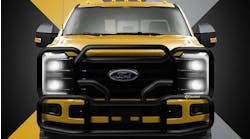I am intrigued by some new technologies for refrigerated trailers. Everyone wants to reduce fuel. Much of what I have done in the past, and do today, is focused on the tractor. However, the fuel used in refrigerated trailers can be saved, which also reduces greenhouse gas. In addition to the typical reefer technology using a diesel engine, I have now seen four other alternatives.
I was familiar with cold plate technology such as that from Dole Refrigerating Company. In June, Morgan Corporation announced some products using this technology. According to Morgan, the unit uses electricity to cool the plates. What I don’t quite understand yet, is how much electricity it takes and where that power is going to come from. While at the Great America Truck show, I heard it might take hundreds of amps at higher voltage to accomplish this. I need to do some more work to understand where this power is coming from and when it is going to be provided.
Then, I heard about nitrogen cooled refrigeration trailers with no moving parts. Well, maybe not quite. There are valves that open and close and, possibly, some fans. Reflect Scientific has been working in this area for some time. Wabash National talked about some work they are doing with the technology at the Commercial Vehicle Outlook Conference this week. Again, I need to learn more about how all that nitrogen is kept cool and what power it takes to control it.
Then, I found Kinetic Power Systems showing at the Great America Trucking Show. It’s their first showing of an alternator that is belt-driven off the rear axle of the trailer to power a bank of lithium-ion batteries to provide an electric cooling system. They claim significant weight savings as well as the elimination of the fuel needed for the reefer. I need to learn more about the payback for this system and the costs. The parasitic load for the alternator puts some load on the tractor engine, since everything creates some sort of a load. They have one unit in the field with a fleet that indicates it can put two extra pallets of frozen food on a trailer with the weight savings.
Shorepower Technologies has been working with Carrier Transicold on an eTRU (Electric Trailer Refrigeration Unit) to provide electricity from off-board the trailer to power the refrigerant unit. That system uses electricity when the vehicle is parked at specific locations at truck stops. When running down the road, it uses a diesel engine.
So, while I have worked on electric vehicles, diesel/electric hybrids and plug-in diesel/electric hybrids, almost all the effort was focused on the truck/tractor. Now, some of those same thoughts can be applied to a refrigerated box/trailer.


